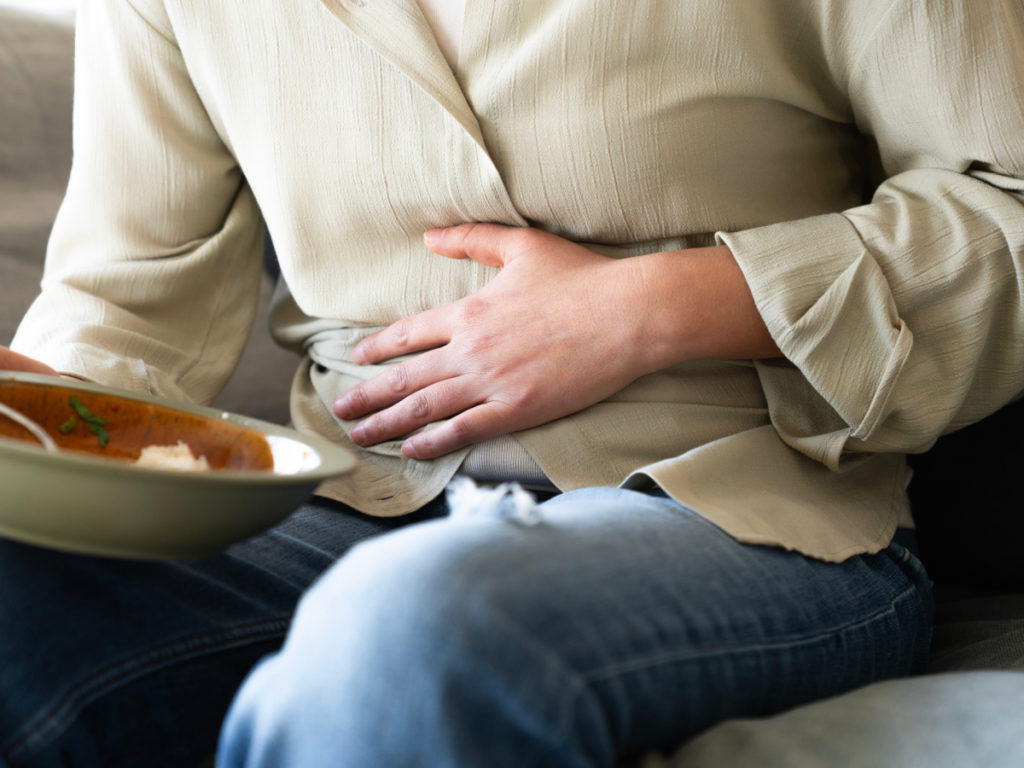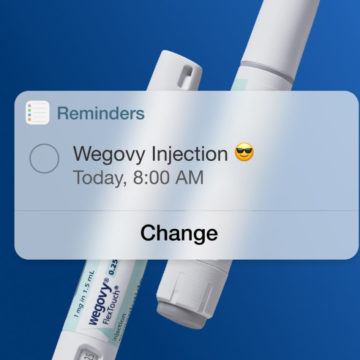Whether you’ve just started taking Wegovy or you’re considering starting weight loss treatment, it’s important to understand side effects and how to manage them. Below, our clinical team has put together a comprehensive guide to understanding and managing side effects.
What is Wegovy?
Wegovy is a weekly injectable weight loss medication that is part of a wider class of drugs called glucagon-like peptide-1 (GLP-1) receptor agonists. It contains the active ingredient, semaglutide, which you may have heard of because it is also the active ingredient in the popular GLP-1, Ozempic.
How Does Wegovy Work?
Wegovy is a GLP-1 (glugacon-like peptide-1) receptor agonist, which works by mimicking the naturally occurring GLP-1 gut hormone in your body that is released after you eat.
It works to promote weight loss in a few different ways:
- Slows stomach (gastric) emptying to help you feel fuller for longer.
- Targets the reward centre in your brain to reduce appetite.
- Regulates your blood sugar levels to prevent cravings. [1]
This makes it easier to make long-term lifestyle changes like eating a balanced diet and increasing your physical activity, with studies showing that semaglutide users lost 15% of their weight in 68 weeks when combined with diet and exercise changes. [2]
Common Side Effects of Wegovy
The most common side effects associated with Wegovy (semaglutide) are gastrointestinal side effects, which means they impact your digestive system. Below, we’ve included a few tips from our experts to help you manage common side effects.
Managing Common Side Effects
Nausea
Nausea is a queasy, unsettled feeling that can make you feel like you might vomit. It can happen with your treatment because the medication slows stomach emptying, keeping food in your stomach longer. This stretches the stomach and sends signals to your brain that trigger the sensation.
The strategies below help with nausea by calming the digestive system and reducing triggers that can make it worse:
- Drink plenty of fluids (cold water, herbal teas)
- Get lots of fresh air
- Eat small and frequent meals
- Reduce intake of foods high in sugar and fat
- Avoid cooking or eating spicy or strong smelling foods
Constipation
Constipation occurs when it’s difficult to pass a stool and you have fewer than three bowel movements in a week, often with hard, dry stools that can be painful to pass. Like nausea, your treatment can cause constipation due to slowing down the movement of food and waste through your digestive system.
To help manage constipation, here’s what we recommend:
- Drink plenty of fluids (water, herbal teas)
- Eat high-fibre foods such as prunes, figs, and oats
- Take regular walks – exercise can stimulate bowel movements.
Indigestion
Indigestion happens because your treatment slows stomach emptying, increasing the chance of acid reflux when stomach acid moves into the food pipe. This can cause heartburn, a burning feeling in the chest or throat, or a sour taste in the mouth.
Try these strategies to help manage indigestion:
- Reducing your caffeine intake
- Don’t eat too close before you go to bed
- Avoid rich, spicy, or fatty foods
- Heartburn medication
Diarrhoea
Diarrhoea is frequent, loose, or watery bowel movements, often with stomach discomfort that worsens before you need the toilet. It’s usually defined as going more than three times a day. With Wegovy, this can occur because the medication slows stomach emptying, which can disrupt normal digestion.
Try these strategies to help manage diarrhoea:
- Drink plenty of fluids (water, herbal teas)
- Eat small and frequent meals
- Rest – take it easy and allow your body to recover
- Consider taking oral rehydration salts from a pharmacist to replace lost fluids and electrolytes
- Paracetamol for pain relief
Vomiting
Wegovy slows stomach emptying to help you feel fuller for longer. However, because food stays in the stomach longer and causes it to stretch, it can trigger signals to the brain that may lead to vomiting.
To manage vomiting, here’s what we recommend:
- Stay hydrated by taking small sips of water. You could also try herbal teas such ginger and peppermint.
- Eat small and frequent meals to keep your energy levels up. Stick to a bland diet that is easy on your stomach, such as toast, rice and bananas.
Finally, if you experience vomiting or severe diarrhoea, it may affect how well other medicines work, so speak to your GP if you’re concerned.
Serious Side Effects
Serious side effects of GLP-1 treatments remain rare, but it is important that you know what to look out for. If you experience any of the following, stop taking your medication immediately.
Pancreatitis
Pancreatitis (also known as inflammation of the pancreas) is a serious condition that requires urgent medical attention. You may be experiencing pancreatitis if you have any of the following symptoms:
Severe, persistent stomach pain. Severe means:
- It’s so intense (around 8 or more out of 10) that you can’t focus on anything else
- It makes it nearly impossible to handle normal daily tasks (like walking, getting dressed, or eating)
- It doesn’t improve with over-the-counter pain relief or rest
- It radiates to your back or underneath your right ribcage or your right shoulder
- You also have severe vomiting (3 or more times a day, or having blood or something that looks like coffee grounds in vomit)
If you notice any of these symptoms, call 999 or head to A&E right away.
Acute Gallbladder Disease
Acute gallbladder disease is defined as inflammation, infection, stones or blockage of the gallbladder and requires immediate medical attention by calling 999 or going to A&E right away.
The following symptoms may indicate that you have gallstones:
- You have severe pain under your right ribcage that extends to your right shoulder or back, which disrupts your normal daily activities (possible acute gallbladder disease).
- The pain is accompanied by vomiting and or a high temperature
- You have a rapid heartbeat
Anaphylaxis or a Severe Allergic Reaction
If you experience any of the following, stop taking your medication immediately. These symptoms could indicate anaphylaxis or a severe allergic reaction that requires urgent medical attention.
- Difficulty breathing, or swelling of the lips, tongue, or throat as these could be signs of a severe allergic reaction, which can be life-threatening.
- Severe pain underneath your right ribcage that may spread to your shoulder or back. This may be accompanied by vomiting, a high temperature or a rapid heartbeat. These symptoms could suggest acute gallbladder problems.
Medication Timing and Routines
Wegovy is administered once a week and staying consistent with your injection routine helps your body adjust and prevent side effects.
While there is no set rules about when you should inject, the below guide can help you figure out the best time for you.
Friday or Saturday: Gives you time to manage potential side effects (like nausea or fatigue) over the weekend, without the added pressure of a workday.
Thursday or Friday: If weekends tend to trigger binge eating or overindulgence, injecting towards the end of the week may also help reduce cravings and encourage more mindful eating.
Monday: May help to reinforce healthy habits and maintain structure throughout the week.
Protocol for Missed Doses
It’s important to administer your medication correctly and at the right time to ensure your safety, maximise your results and help prevent side effects.
If you miss a dose of Wegovy, it should be administered as soon as possible and within 5 days after the missed dose. If more than 5 days have passed, the missed dose should be skipped, and the next dose should be administered on the regularly scheduled day.
If you have any questions about how to proceed after missing a dose, contact our clinical team for advice.
Underlying health conditions
Semaglutide is not safe for everyone and should be avoided in certain situations. Some safety research has linked it to thyroid tumours, so it should not be used by anyone with a personal or family history of medullary thyroid cancer (MTC) or multiple endocrine neoplasia type 2 (MEN2).
It should also not be taken during pregnancy, as animal studies show it may increase the risk of birth defects. Because semaglutide stays in the body for a long time, it’s important to stop taking it at least two months before trying to become pregnant. Women using semaglutide should use birth control, but Wegovy does not reduce the effectiveness of oral contraceptive pills. The medication should also not be used while breastfeeding.
Ready to Start Your Weight Loss?
If you’re ready to start your weight loss journey, the team at MedExpress can assess your eligibility and help you find a treatment that suits your lifestyle.
References
- Wegovy 0.25 mg, FlexTouch solution for injection in pre-filled pen – Summary of Product Characteristics (SmPC) – (emc) [Internet]. www.medicines.org.uk. Available from: https://www.medicines.org.uk/emc/product/13799/smpc#gref
- Wilding JPH, Batterham RL, Calanna S. Once-Weekly Semaglutide in Adults with Overweight or Obesity. The New England Journal of Medicine [Internet]. 2021 Feb 10;384(11):989–1002. Available from: https://www.nejm.org/doi/full/10.1056/NEJMoa2032183



